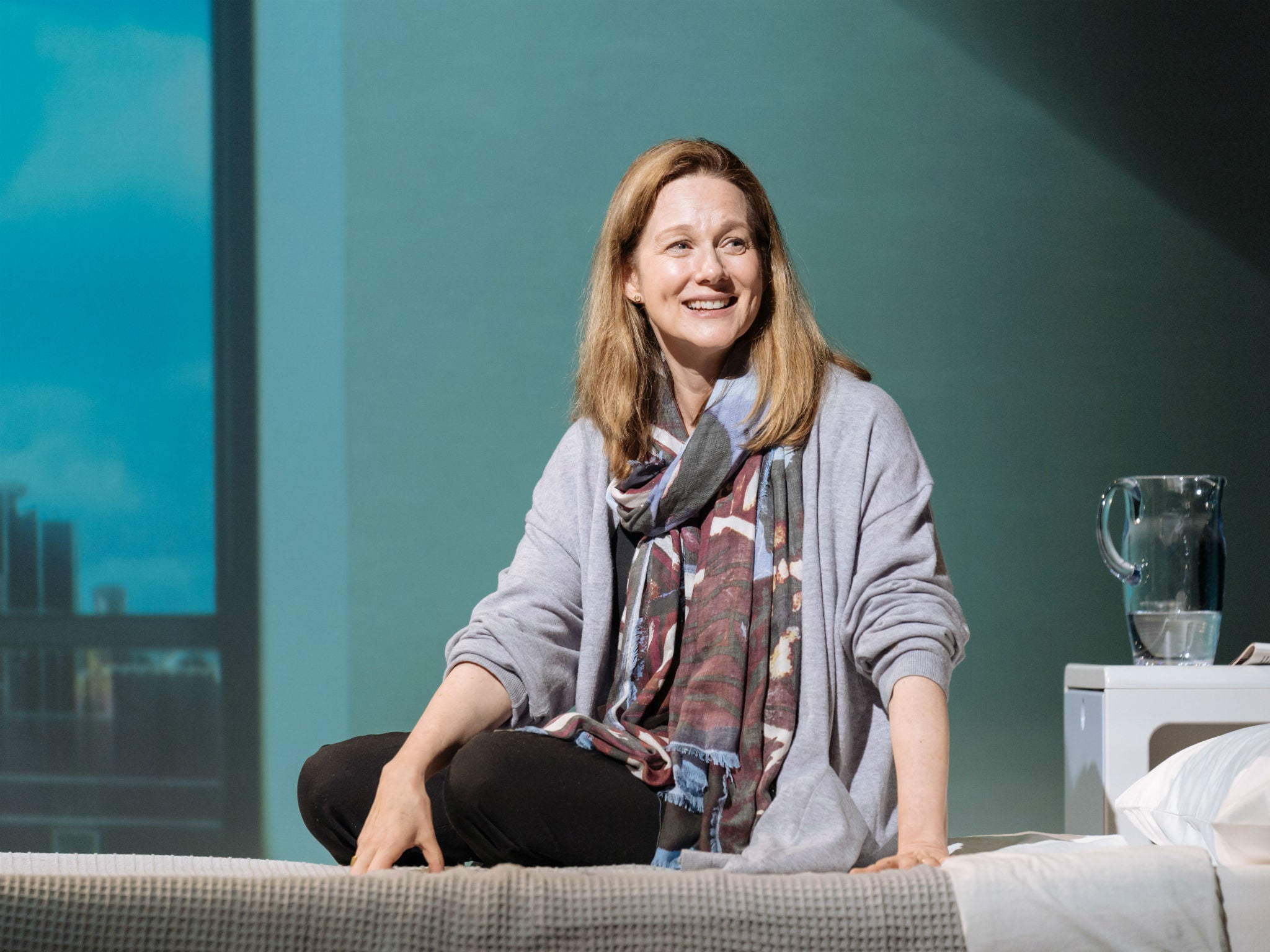My Name is Lucy Barton, Bridge Theatre, London, review: Laura Linney is luminous in this one-woman show
The Oscar-nominee gives a deeply affecting performance of real directness in Rona Munro’s adaptation of Elizabeth Strout’s bestselling novel

Laura Linney gives a luminous – unaffected and deeply affecting – performance in this 90-minute monodrama which has been adapted by Rona Munro from the bestselling, first-person novel by Elizabeth Strout.
The three-time Oscar nominee manages to achieve an extraordinary directness of contact with the audience, who are wrapped around the thrust stage at the Bridge Theatre, and to snag everybody’s heart as she evokes the character’s pensive honesty about the pain that underlies what we can’t or choose not to say.
From the perspective of the present day (she’s now a successful, remarried author), Lucy takes us back to the mid-1980s in New York when she found herself in hospital for nine weeks after an appendectomy went wrong. Her husband is too phobic about hospitals to visit; she misses her daughters who were too young to come alone.
Then, one day, she wakes up to find her estranged mother sitting at the foot of her bed. Lucy escaped to the Big City from a grindingly poor and isolated background in the tiny rural town of Amgash, Illinois. It’s years since she and her mother have seen one another. Resentments fester on both sides.
You’d be unwise, though, to anticipate a redemption narrative a la Terms of Endearment. Before a week is out, the mother leaves, having never said (in so many words) “I love you”.
Linney juggles both sides of the conversation with consummate ease, slipping into a harsh mid-Western twang for the mother who specialises – to horribly comic effect, at times – in rather triumphant stories about the failed lives of women Lucy used to know. Her one moment of finger-pointing fury and denial is when, in a conversation about Elvis Presley having been “trash”, her daughter responds by saying: “We were trash. That’s exactly what we were.”
Bullied by other children for smelling odd and for having no access to popular culture, Lucy and her siblings were treated as freaks when they were young. She found solace in the world of books (the library was a warm sanctuary from the bitter cold of home) and tried to make sense of her traumatising youth in her prose. But the loneliness, as Linney beautifully intimates in piercing shafts, is bone-deep and life-long.
Richard Eyre’s production is exquisitely modulated. Bob Crowley’s simple design comprises a bed and a chair and a set of recessed rectangles at the back that become the screen for Luke Halls’ evocative video designs – the Chrysler Building seen from Lucy’s hospital window; a farmhouse isolated in a great field of crops; the condensation running down the windscreen of the family truck where Lucy (dreading snakes) would be shut up as a punishment when she was a small child, and so on. Sometimes these images seem to slide down in streaks and look like beautiful abstract paintings, melted by memory from clear figuration.
My Name is Lucy Barton does not conform to any of the conventional ideas about dramatic structure. That’s one of its signal strengths. Director, adaptor, and star Linney are wonderfully faithful to Strout’s observation in the programme that “Lucy’s voice IS almost the plot, I think”. They are feelingly attentive to the recurring musical patterns in the protagonist’s preoccupations with such matters as the ruthlessness and open heart needed for writing; the unreliability of memory, and our inability to know fully even those closest to us.
So Lucy’s moment of sunset affirmation at the end (the lovely lighting is by Peter Mumford) feels like a gorgeous gathering of threads, all the more moving because of the production’s immaculate restraint.
Until 23 June (bridgetheatre.co.uk)
Join our commenting forum
Join thought-provoking conversations, follow other Independent readers and see their replies
0Comments